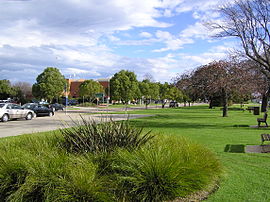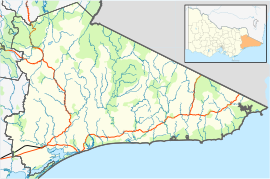Bairnsdale, Victoria
|
Bairnsdale Victoria |
|||||||
|---|---|---|---|---|---|---|---|

Bairnsdale Gardens Main Street
|
|||||||
| Coordinates | 37°50′0″S 147°37′0″E / 37.83333°S 147.61667°ECoordinates: 37°50′0″S 147°37′0″E / 37.83333°S 147.61667°E | ||||||
| Population | 14,271 (2015) | ||||||
| • Density | 597.1/km2 (1,547/sq mi) | ||||||
| Established | 1860 | ||||||
| Postcode(s) | 3875 | ||||||
| Elevation | 49 m (161 ft) | ||||||
| Area | 23.9 km2 (9.2 sq mi) (2011 Census UCL) | ||||||
| Location | |||||||
| LGA(s) | Shire of East Gippsland | ||||||
| State electorate(s) | Gippsland East | ||||||
| Federal Division(s) | Gippsland | ||||||
|
|||||||
Bairnsdale (/ˈbɛərnzdeɪl/, locally [ˈbeːnzdæɪl]) is a city in East Gippsland, Victoria, Australia. The estimated population of Bairnsdale urban area was 14,271 at June 2015. The city is a major regional centre of eastern Victoria along with Traralgon and Sale and the commercial centre for the East Gippsland region and the seat of local government for the Shire of East Gippsland. Bairnsdale was first proclaimed a shire on 16 July 1868 and it was proclaimed as a city on 14 July 1990.
The origin of the city's name is uncertain. It would have almost have certainly been Bernisdale, with "Bernis-dale" originating from "Bjorn’s dale", or glen which indicates the Viking origins of the Skye Village. Legend has it that Macleod was impressed by the number of Children on the run, the children of his stockmen, that he called it Bairns-dale, or "valley of the children".
In 1876 the Bairnsdale Shire, which went on to become one of the largest in Victoria in the 1880s, was led out of administrative chaos by former shire auditor and shipping agent Herman Bredt. He had also acted as a mine manager for the nearby Sons of Freedom mine. German born Bredt was the father of Bertha Bredt who married the famous Australia poet and writer Henry Lawson. Prior to this she had worked at the Bairnsdale Hospital. In this period the Main Street was fashioned but was unsealed thereby causing extensive problems of dust in the summer and mud in the winter. Asphalting didn’t take place until 1883. Nicholson Street was formed in 1877 and MacLeod Street followed in 1879.
...
Wikipedia

